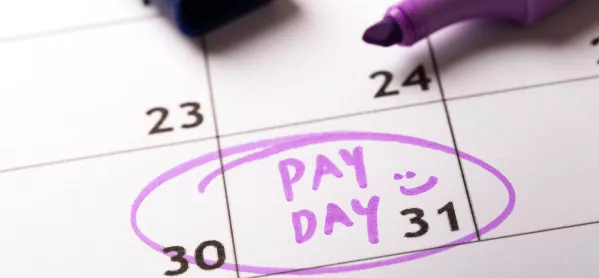Teachers will be given a 2.75 per cent pay rise, at least partially funded by new money from the Treasury, it has been reported.
It is part of a £2 billion pay settlement for public sector workers that is set to be unveiled on Monday, according to the Times.
The increase for teachers compares to an anticipated 2.9 per cent increase for soldiers, while dentists and consultants will get 2.5 per cent and senior civil servants 2 per cent.
Quick read: DfE pushing for extra cash to fund teacher pay rise
Hinds: I want to stay and finish the job under new PM
2018: Teachers to receive up to 3.5 per cent pay rise
The Treasury is expected to say that, barring some extra funding for schools, the money will have to come from existing budgets.
The newspaper said that education secretary Damian Hinds has successfully argued for a 2.75 per cent rise for teachers across all pay ranges and allowances.
Kevin Courtney, joint general secretary of the NEU teaching union, said the reported pay rise "isn't enough".
He added: "Even at 2.75 per cent, teacher pay will again fall in real terms compared to RPI inflation and fall further behind pay increases in the wider economy, when a worsening recruitment and retention crisis means we need urgent action to restore the pay losses since 2010 and make teacher pay competitive with pay for other graduate professions.
“If the pay rise isn’t funded in full this will mean more cuts to our children’s education."
The reported pay rise is below the 3.5 per cent increase announced last year for teachers on the main pay scale, but above the 2 per cent for those on upper pay scale and 1.5 per cent for school leaders.
The School Teachers’ Review Body (STRB), which advises the government on teacher pay, last year recommended that teachers at all levels receive the same 3.5 per cent rise.
It is not yet known what recommendations the STRB has made for the current pay round.
The reported pay rise comes amid the continuing teacher recruitment and retention crisis.
Mr Hinds today told Tes that this was a key priority, and that he wanted to remain as education secretary under the next prime minister so that he could continue to address it.
Jonathan Cribb, a senior research economist at the Institute for Fiscal Studies, told the Times: "These public sector pay rises are higher than last year's and considerably higher than the 1 per cent for many years before that.
"It is the highest nominal pay increase since the coalition. But these increases are still slower than pay rises that are happening on average in the private sector.
"With the partial exception of schools, there seems to be no new money to fund these pay rises, meaning savings will have to be made elsewhere."
The announcement will come during Theresa May's last days in Downing Street, with either Boris Johnson or Jeremy Hunt taking over the top job.
During the leadership contest, frontrunner Mr Johnson refused to commit to a pay rise for public sector workers despite an apparent policy pledge by one of his key backers, health secretary Matt Hancock.
Shadow chancellor John McDonnell was critical of the raise after years of austerity.
"With overall wage growth at 3.4 per cent, it looks like Philip Hammond's final act as chancellor will be this insulting pay offer set to push public sector workers further behind," the Labour MP said.
"After years of holding back the pay of our dedicated public sector workers, it is shameful for the government to pay for ending the public sector pay cap with more cuts."




